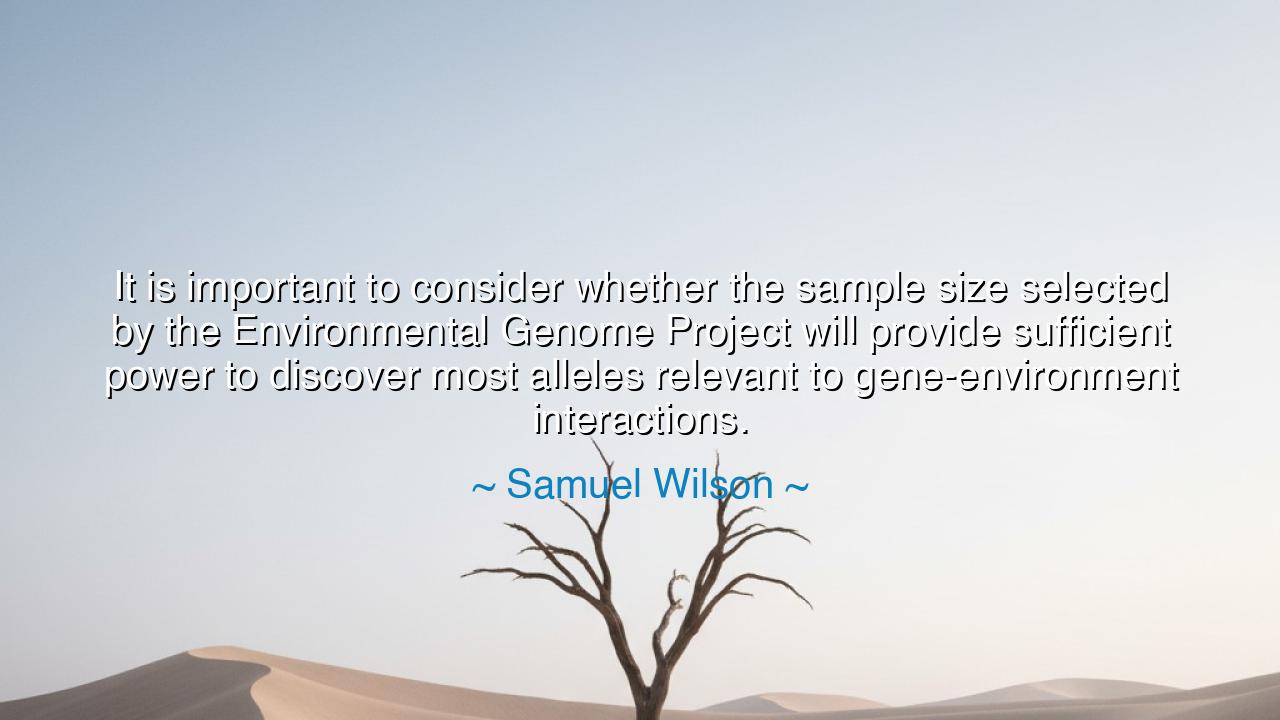
It is important to consider whether the sample size selected by
It is important to consider whether the sample size selected by the Environmental Genome Project will provide sufficient power to discover most alleles relevant to gene-environment interactions.






Hear the voice of Samuel Wilson, physician and servant of science, who declared: “It is important to consider whether the sample size selected by the Environmental Genome Project will provide sufficient power to discover most alleles relevant to gene-environment interactions.” At first hearing, these words seem the language of laboratories and scholars, bound within the walls of research. Yet if we look deeper, we find wisdom of universal reach. For what Wilson speaks is not only of sample size and alleles, but of preparation, foresight, and the careful foundation that must precede any great discovery.
The Environmental Genome Project was conceived as a mighty effort to map how our very genes respond to the world around us—whether to the food we eat, the air we breathe, or the poisons we release into soil and sky. In this work lies the promise of understanding why some fall ill while others remain strong, though they dwell in the same place and share the same burdens. Yet Wilson reminds us of a danger: if the sample size—the number of lives studied—is too small, then the vision of the project will be clouded, unable to grasp the full tapestry of human diversity. The search for truth must be wide enough to capture all voices, lest it become narrow and misleading.
This principle is not confined to science. History, too, shows the peril of seeking wisdom with too small a circle. Consider the tale of the Athenian assembly, which once prided itself on democracy but restricted citizenship and voice to only a fraction of its people. Women, slaves, and foreigners were cast aside, and thus the wisdom of the city was diminished. Decisions were made by a narrow sample, and though Athens shone for a time, its lack of inclusiveness planted seeds of weakness that would later contribute to its fall. Just as a narrow assembly cannot reflect the whole, so too a narrow study cannot reveal the truth of nature’s design.
Wilson’s warning is both scientific and moral. To discover the alleles—the variations of genes—that matter most in gene-environment interactions, one must embrace breadth and depth. The farmer who studies only one patch of soil cannot know the richness of his whole field. The leader who listens only to one council cannot guide a whole people. And the scientist who examines only a small group cannot understand the vast and varied inheritance of humanity. Thus the power of discovery lies not in haste or economy, but in patience and comprehensiveness.
The emotional essence of this teaching is humility before complexity. Life is not simple, and its mysteries are not revealed to the careless or the narrow-minded. Just as the great builders of cathedrals laid stone upon stone with patient care, knowing that one weak foundation could bring the whole edifice to ruin, so too must those who study life take heed of the strength of their design. The sample size is no trivial matter—it is the very ground upon which the truth must stand.
The lesson for us all is this: in every endeavor, whether in science, governance, or personal life, begin by asking whether the foundation is wide enough, deep enough, strong enough to hold the truth you seek. Do not rush to conclusions from too small a pool of evidence, nor think that the experience of the few is sufficient for the many. True wisdom requires patience, breadth, and inclusiveness.
What then shall you do? First, when seeking knowledge, ensure your view is broad—read widely, listen to many voices, and gather much evidence before you decide. Second, value diversity, for in it lies resilience and truth; just as varied alleles protect a species, varied perspectives strengthen a community. Third, be patient with the search for wisdom, knowing that haste often blinds, while care reveals.
And remember always: Wilson’s words, though born in the halls of science, are a teaching for life itself. The power to discover truth lies in the breadth of our vision and the strength of our foundations. Whether mapping the genome, leading a people, or guiding your own soul, seek always to include enough, to learn enough, to prepare enough—so that the truth you uncover may stand firm and endure.






AAdministratorAdministrator
Welcome, honored guests. Please leave a comment, we will respond soon